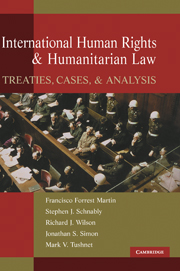Book contents
- Frontmatter
- Contents
- TABLE OF SELECTED AUTHORITIES
- PREFACE
- 1 AN OVERVIEW OF INTERNATIONAL HUMAN RIGHTS AND HUMANITARIAN LAW DEVELOPMENT AND THEIR PROTECTION MECHANISMS
- 2 FORMAL SOURCES AND PRINCIPLES OF INTERNATIONAL HUMAN RIGHTS AND HUMANITARIAN LAW
- 3 INCORPORATION OF INTERNATIONAL HUMAN RIGHTS AND HUMANITARIAN LAW IN U.S. LAW
- 4 INTERNATIONAL HUMAN RIGHTS TRIBUNAL PROCEDURE AND REMEDIES
- 5 SUBSTANTIVE INTERNATIONAL HUMAN RIGHTS AND HUMANITARIAN LAW PROTECTIONS
- 6 THEORY AND CRITIQUE
- INDEX
6 - THEORY AND CRITIQUE
Published online by Cambridge University Press: 05 June 2012
- Frontmatter
- Contents
- TABLE OF SELECTED AUTHORITIES
- PREFACE
- 1 AN OVERVIEW OF INTERNATIONAL HUMAN RIGHTS AND HUMANITARIAN LAW DEVELOPMENT AND THEIR PROTECTION MECHANISMS
- 2 FORMAL SOURCES AND PRINCIPLES OF INTERNATIONAL HUMAN RIGHTS AND HUMANITARIAN LAW
- 3 INCORPORATION OF INTERNATIONAL HUMAN RIGHTS AND HUMANITARIAN LAW IN U.S. LAW
- 4 INTERNATIONAL HUMAN RIGHTS TRIBUNAL PROCEDURE AND REMEDIES
- 5 SUBSTANTIVE INTERNATIONAL HUMAN RIGHTS AND HUMANITARIAN LAW PROTECTIONS
- 6 THEORY AND CRITIQUE
- INDEX
Summary
In this section, we address the theoretical and critical approaches to international human rights and humanitarian law. By placing these materials at the end of the casebook's treatment of the historical, organizational, procedural, and substantive aspects of human rights and humanitarian law, we believe that students will be in a better position to understand the abstract and critical issues raised by the following works.
Richard Falk
The End of World Order: Essays on Normative International Relations (1983)
[An] important development in the 350 years that have elapsed since Grotius did his work is the changed character of the sovereign state. The government of such a state can no longer be associated with a series of European Christian princes. In the contemporary world, the state is more typically dominated by a faceless bureaucracy that is governed by leaders who are selected and rejected at short intervals or are kept in power for longer periods by sheer brute force, and whose religious and cultural backgrounds embrace the diversities of the main global traditions. The Grotian solution presupposed the personal character of royal rulership in Europe and is not fully transferable to global bureaucracies and the secularization of power that has evolved into the modern post-seventeenth-century state and that has steadily diffused the responsibility and eroded the spirituality of political leadership….
Given the peculiar burdens posed by nuclear weaponry, ecological decay, population pressures, and expectations of equity, the renewal of the Grotian quest in our time cannot rely credibly on a shared heritage of normative traditions as reinforced by the conscience of contemporary leaders.
- Type
- Chapter
- Information
- International Human Rights and Humanitarian LawTreaties, Cases, and Analysis, pp. 938 - 986Publisher: Cambridge University PressPrint publication year: 2006



